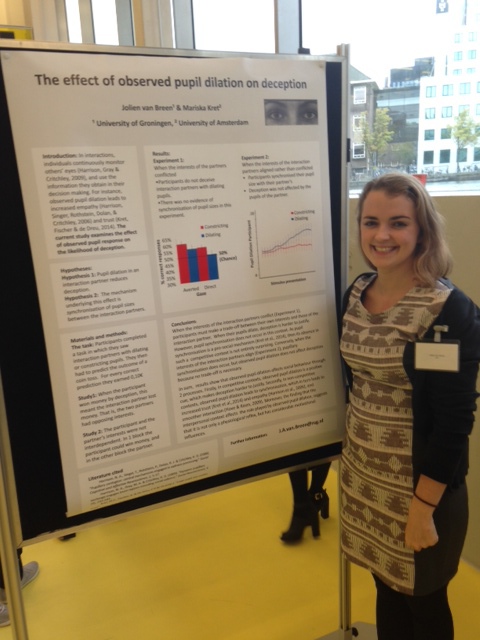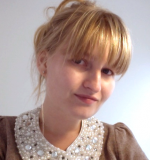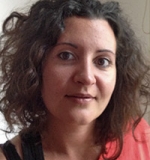You can read the new Psychonoom here.
For older editions click here.
Happy New Year!
Author Archives: admin
PhD position in the Dutch Research Consortium ‘Language in Interaction’ (1 FTE)
Maximum salary: € 2,664 gross/month
Application deadline: 1 February 2015
For more information click here
The NWO Gravitation consortium ‘Language in Interaction’ invites applications for a PhD position on “Processing Vague Expressions: The Interplay between Semantics, Pragmatics and Cognition”.
A vague term like ‘big’ can be easily used and processed when there is a clear gap between bigger and smaller objects. We will test the hypothesis that a gap in distribution is the default criterion used in the processing of vague words in classificatory tasks, but that other criteria might also come into play. We will also test whether a similar default exists for the processing of quantity expressions such as ‘most’ (use the approximate number system if there is a gap, and precise counting otherwise). The ultimate goal is a unified theory of the processing of vague expressions.
The Netherlands has an outstanding track record in the language sciences. The research consortium ‘Language in Interaction’, sponsored by a large grant from the Netherlands Organization for Scientific research (NWO) brings together many of the excellent research groups in the Netherlands with a research programme on the foundations of language. The consortium includes representatives from seven universities and one research institute in the Netherlands. These are: Radboud University (RU), University of Amsterdam (UvA), University of Maastricht (UM), Leiden University (LU), Utrecht University (UU), Erasmus University Rotterdam (EUR), Tilburg University (TiU), and the Max Planck Institute for Psycholinguistics (MPI). Excellence in the domain of language and related relevant fields of cognition is combined with state-of-the-art research facilities and a research team with ample experience in complex research methods and utilization. This consortium achieves both quality and critical mass for studying human language at a scale not easily found anywhere else in the world.
This project will involve collaborative work to be carried out at the Institute of Logic, Language and Computation (ILLC) at the University of Amsterdam (Prof. Van Rooij) and the Donders Institute for Brain, Cognition and Behaviour at Radboud University (Prof. H. Schriefers). The position will be embedded in the ILLC.
Both institutes conduct research in an international setting. English is the lingua franca.
Click here for more information on the Junior PI position and how to apply.
Junior PI Position ‘Neuroanatomy of Language’ in Dutch Research Consortium ‘Language in Interaction’ (1 FTE)
Maximum salary: € 5,070 gross/month
Closing date: 01 February 2015
Click here for more information.
The NWO Gravitation consortium ‘Language in Interaction’ invites applications for a junior PI position.
We are looking for a highly motivated, creative and talented researcher who is able to establish a junior PI group on ‘the neuroanatomy of language’. The junior PI and his/her group will enrich a unique consortium of researchers that aims to unravel the neurocognitive mechanisms of language at multiple levels. The goal is to understand both the universality and the variability of the human language faculty from genes to behaviour.
You will be given the opportunity to establish your own independent research group, and you will have free access to the Donders Institute’s scanning facilities. You will be expected to conduct research in one or more research areas relevant to the position applied for. Supervision of BSc, MSc and PhD projects will be part of your responsibilities. Administrative duties will include local and/or national and international committee memberships. You will be provided with budgetary resources for a PhD candidate or technician, materials and consumables.
The Netherlands has an outstanding track record in the language sciences. The research consortium ‘Language in Interaction’, sponsored by a large grant from the Netherlands Organization for Scientific research (NWO) brings together many of the excellent research groups in the Netherlands with a research programme on the foundations of language. The consortium includes representatives from seven universities and one research institute in the Netherlands. These are Radboud University (RU), University of Amsterdam (UvA), University of Maastricht (UM), Leiden University (LU), Utrecht University (UU), Erasmus University Rotterdam (EUR), Tilburg University (TiU), and the Max Planck Institute for Psycholinguistics (MPI). Excellence in the domain of language and related relevant fields of cognition is combined with state-of-the-art research facilities and a research team with ample experience in complex research methods and utilization. This consortium achieves both quality and critical mass for studying human language at a scale not easily found anywhere else in the world.
The position will be embedded in the Donders Institute for Brain, Cognition and Behaviour at Radboud University and the Max Planck Institute for Psycholinguistics. Both institutes conduct research in an international setting. English is the lingua franca.
Click here for more information on the Junior PI position and how to apply.
Postdoc position in Cognitive Neuroscience (Leiden University)
Postdoc position in Cognitive Neuroscience Closing date: 24 November 2014
For more information: http://www.sandernieuwenhuis.
Research Project “Arousal, neural gain and cognitive function” Arousal has a wide variety of effects on human attention and performance, as documented in a rich empirical literature that was developed mainly before the 1980s. The computational and neural mechanisms underlying these effects, however, are still poorly understood. The goal of the present project is to revisit this literature and try to understand the relationships between arousal and cognition by applying recent computational models and insights about the role of neuromodulator systems in cognitive function (e.g., models of the noradrenergic modulation of neural gain). The newly developed ideas can then be tested using various methods, including EEG, genetics, psychopharmacology, and pupillometry. Although much of the research will be focused on the brain, the main goal is to understand the basic mechanisms underlying the influence of arousal on cognitive function.
NVP POSTER AWARD won by Jolien van Breen
Jolien van Breen (University of Groningen) has won the NVP poster award 2014 for her research “The effect of observed pupil dilation on deception”.
About her research:
Following each other’s gaze and attending to pupil size allows humans to communicate information about the immediate environment. “Pupillary contagion” is the synchronization of pupil sizes with an interaction target. Interestingly, pupillary contagion has adaptive value, e.g., to promote shared understanding and coordination, because it emerges within, but not across species. This can be observed when humans synchronize their pupils specifically with other humans, but not with chimpanzees. Pupil synchronization is uniquely human, as it does not occur in our closest relative, the chimpanzee (P. troglodytes). In our studies on the effects of pupillary contagion on trust and deception, we demonstrated that pupillary contagion induced trust and reduced the likelihood of deception.
NVP POPULARISATION AWARD won by Claudia Pama and Roberta Sellaro
Claudia Pama (University of Cambridge) and Roberta Sellaro (Leiden University) have won the NVP popularization award 2014 in the category “VIDEO/BLOG” for their video “Reducing prejudice through brain stimulation”.
About their research:
More than fifty years have passed since the day Martin Luther King Jr. pronounced one of the most inspiring speeches of the Twentieth century. Nonetheless, today it is still quite hard to look at the outside world and think with confidence that the dream of the American clergyman will become more than a dream in the near future. In fact, everlasting ethnic, religious and cultural wars (just open any newspaper for examples), rash immigratory policies, everyday violence and implicit and explicit ghettoization demonstrate that social discrimination is still one of the leitmotifs of human history. We used a noninvasive brain stimulation technique, transcranial direct current stimulation (tDCS), to modulate implicit bias toward social discrimination. We found that stimulating the prefrontal cortex, brain area related to social discrimination, we were able to reduce negative implicit attitudes toward members of an out-group. So, our results imply that, as dreamed by Martin Luther King, it will be possible to reduce prejudice.
Claudia Pama
Roberta Sellaro
NVP POPULARISATION AWARD won by Marc Brysbaert
Prof Marc Brysbaert, Professor of Experimental Psychology at the University of Gent (Belgium), has won the NVP popularization award 2014 in the category “MULTIMEDIA” for his groundbreaking research “Het taalonderzoek” (http://www.npowetenschap.nl/
About his research:
We started our vocabulary research from the observation that some words rarely encountered in books and television programs, are generally known. This goes against the tenet that word frequency is the best variable to predict word knowledge and speed of processing. Apparently, some words are acquired very rapidly (probably after a single encounter) or can be processed on the basis of prior knowledge (e.g., in the case of low frequency derived words). To find out how well words are known, we set up a short vocabulary test that was fun to do. As it was important to have many responses from a wide audience, we were happy to collaborate with the media (television, radio, newspapers). In the end, more than 2% of the Dutch speaking population (i.e., more than 440,000 persons) took part in the test so far. Preliminary analyses indicate that the percentage of people of who know a word (a variable we call word prevalence) explains as much variability in word processing times as word frequency and, in addition, is largely complementary to word frequency. This will seriously enhance our understanding of word learning and word processing. At the same time, the outcome of our research is also a nice historical document of Dutch word knowledge at the beginning of the 21st century. The data are freely available on the web, but are now also available as a book (http://www.academiapress.be/woordenkennis-van-nederlanders-en-vlamingen-anno-2013.html), for those who love to leaf through pages.

EPOS Expert Workshop on Working Memory
We are pleased to announce the EPOS Expert Workshop on Working Memory, held 11 & 12 December 2014 in Amsterdam.
The workshop broad range of experts from within the EPOS network and from abroad (in no particular order):
Prof. Dr. Andrew Conway (Princeton University) Individual differences in working memory
Prof. Dr. Torkel Klingberg (Karolinska Institute) Training and plasticity of working memory
Prof. Dr. Klaus Oberauer (University of Zurich) Cognitive models of working memory
Dr. Nancy Carlisle (University of Leicester) EEG markers of visual memory
Dr. Lorenza Colzato (Leiden University) Pharmacological underpinnings of working memory and cognitive control
Prof. Dr. Pieter Roelfsema (Netherlands Institute of Neuroscience) Neurocomputational modelling of visual memory
Dr. Mariette Huizinga (VU University of Amsterdam) Development of working memory and executive control in children and young adults
Prof. Dr. Steve Majerus ( University of Liège) Working memory interactions with language and attention
Dr. Ilja Sligte (University of Birmingham) Different stages of visual working memory
The full line-up and programme can be found here.
The goal of EPOS expert workshops is to educate PhD students of the EPOS Research School on the latest developments in the field. The workshop features a wide range of conceptual topics, from visual memory to executive functioning, from individual differences to plasticity. But the meeting is no doubt also interesting to (and therefore open to) a wider audience, from students to seniors. Registration will be limited to about 75 people in total.
Registration is free for PhD students with an EPOS membership, and they will receive 1 ECTS.
Registration will be 250 euro for non-EPOS members. This will include the two-day programme, lunch and drinks (borrel).
Inquiry – Please indicate your interest
For practical purposes, at this stage we like to count the number of people who plan to attend the workshop. By indicating your interest you are not committing, registering or paying for anything. Please indicate your interest here.
Registration will open later, on www.eposgradnet.nl.
Looking forward to seeing you at this fantastic meeting,
The organizing team,
Chris Olivers
Anouk van Loon
Seven PhD Positions in the Dutch Research Consortium ‘Language in Interaction’
Maximum salary: € 2,664 gross/month
Closing date: 30 September 2014
For more information:
http://www.languageininteraction.nl/jobs/id-2nd-phd-call-general.html
We are looking for highly motivated PhD candidates to enrich a unique consortium of researchers that aims to unravel the neurocognitive mechanisms of language at multiple levels. The goal is to understand both the universality and the variability of the human language faculty from genes to behaviour.
The Netherlands has an outstanding track record in the language sciences. This research consortium sponsored by a large grant from the Netherlands Organization for Scientific research (NWO) brings together many of the excellent research groups in the Netherlands with a research programme on the foundations of language. The research team consists of 43 Principal Investigators. In addition to the excellence in the domain of language and related relevant fields of cognition, our consortium provides state-of-the-art research facilities and a research team with ample experience in the complex research methods that will be invoked to address the scientific questions at the highest level of methodological sophistication. These include methods from genetics, neuroimaging, computational modelling, and patient-related research. This consortium realizes both quality and critical mass for studying human language at a scale not easily found anywhere else.
Currently, the consortium advertises seven PhD positions for a period of 4 years. Depending on the PhD position applied for, candidates will be appointed at one of the home institutions of the consortium. These positions provide the opportunity for conducting world-class research as a member of an interdisciplinary team.
Click here for more information on the PhD positions and how to apply.
Three Tenure Track Positions – Dutch Research Consortium “Language in Interaction”
For more information click here.
The Dutch NWO Gravitation consortium “Language in Interaction” invites applications for three tenure track positions. These positions are offered with a view to long-term embedding of interdisciplinary language research.
Successful candidates will be given the opportunity to establish their own independent research group. You will be expected to conduct research in one or more research areas relevant to the position applied for. Supervision of BSc, MSc and PhD projects will be part of your responsibilities. Administrative duties will include local and/or national committee memberships. Some contribution to teaching will be appreciated. You will be provided with budgetary resources, a PhD student or technician, materials and consumables.
The Netherlands has an outstanding track record in the language sciences. The Language in Interaction consortium brings together many of the excellent research groups in the Netherlands in a research programme on the foundations of language.
Depending on the tenure track position applied for, the successful candidate will be appointed at one of the following partner institutes:
1) Radboud University Nijmegen & RadboudUMC – Donders Institute for Brain, Cognition, and Behaviour
2) Radboud University Nijmegen – Centre for Language Studies
3) University of Amsterdam – Institute for Logic, Language and Computation.
All these institutions conduct research in an international setting. English is the lingua franca.
We are looking for highly motivated, creative and talented researchers with a strong research profile. Each tenure track position has its own requirements and profile.
General requirements for the tenure track positions are:
− a PhD degree in a field relevant to the position concerned;
− an established international reputation;
− strong track record of peer-reviewed international publications;
− experience with successfully applying for external funding;
− experience with (co-)supervision of PhD students;
− management skills required for academic leadership;
– outstanding teaching skills, teaching experience, and a clear vision on teaching.
More information on the three tenure track positions offered and how to apply can be found here.



